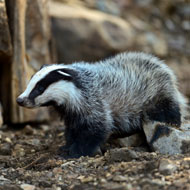BVA 'can no longer support' controlled shooting

Independent monitoring of the first year of the culls found they failed on humaneness and effectiveness.
After two years of badger culling, the BVA says it 'can no longer support the continued use of controlled shooting', as the pilot culls have failed to demonstrate that this method can be used effectively and humanely.
Instead, the association is calling for a wider roll-out of the culls using cage trapping and shooting.
Criticism of the badger culls in Somerset and Gloucestershire has been fuelled by an independent report on the first year of the culls, which found they had failed on humaneness and effectiveness.
While the BVA Council has decided to withdraw its support for controlled shooting, the association's president, John Blackwell, said: "BVA remains convinced that if we are to tackle this disease then we need to control the infection in the wildlife population, and badger culling must form part of the comprehensive strategy for tackling bovine TB."
He adds that the spread of bovine TB in cattle and wildlife is having "an unacceptable impact on animal health and welfare" and poses a threat to human health too.
For this reason, the BVA is urging the next government to commit to a TB strategy that makes use of all the tools at our disposal - including badger culling in Somerset and Gloucestershire, and other areas where badgers are believed to contribute to high incidence of TB in cattle.
The comprehensive eradication strategy should also encompass biosecurity, surveillance and control of cattle and non-bovines (e.g. camelids), badger vaccination, and researching improved diagnostics, a cattle vaccine, oral badger vaccine and alternative, humane badger control methods.
BVA says cage trapping and shooting was 'tried and tested' in the Randomised Badger Culling Trial, which found the method can offer a safe, humane and effective cull.
Mr Blackwell concluded: "In the public debate on badger culling and bovine TB, we are in danger of losing sight of the many other important control measures being applied."



 The Veterinary Medicines Directorate (VMD) is inviting applications from veterinary students to attend a one-week extramural studies (EMS) placement in July 2026.
The Veterinary Medicines Directorate (VMD) is inviting applications from veterinary students to attend a one-week extramural studies (EMS) placement in July 2026.